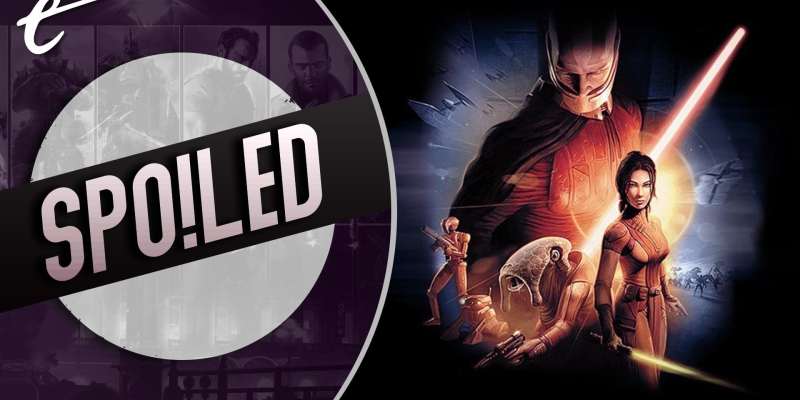Star Wars: Knights of the Old Republic (KOTOR) is one of the most influential RPGs ever made, if not one of the most influential games full stop. It’s so beloved that rumors are circulating it’s getting a full-blown remake from the folks at Aspyr. And one of the main things that those who have played KOTOR (and probably many who haven’t played it) remember about it is the mid-game spoiler.
Because of that, KOTOR is one of those games that was bound to turn up on Spoiled sooner or later. So, before the alleged remake is revealed, let’s talk about KOTOR and its big reveal — and why that reveal was such a big deal both then and now.
Spoiling the Twist of KOTOR (Though You Probably Don’t Need Me To)
If you know anything about games, Star Wars, and the intersection between the two, you know that BioWare’s Knights of the Old Republic is most lauded and praised even now for its twist. That you, the apparent nobody that is the player character, are actually the Sith Lord Revan post-Jedi brainwashing.
All this time you’ve been tricked into believing that you’re accomplishing something through your own merits, only to realize you’ve been furthering someone else’s objective. After the reveal, the game presents you with a choice: Do you want to continue to thwart the activities of your wayward apprentice, Darth Malak, but on your terms? Or do you want to return to your life and goals as a Sith — again, on your terms?

Since this game’s release, Revan has been a staple of the Star Wars Expanded Universe, with their appearance being a built-in spoiler for KOTOR. They’re such a popular character that allegedly Disney has re-canonized them after consigning most other Expanded Universe material to the “Legends” continuity. (it happened in an art book, so I wouldn’t blame you if that slipped under your radar.)
But why was the Revan twist so impactful? What about this big revelation was such a trip that it’s stuck in everyone’s minds almost two decades later? I would argue a big part if it isn’t so much the twist by itself — it’s the choice afterwards that the game presents to the player.
Power of the Dark Side
KOTOR uses the Light and Dark Sides of the Force as storytelling shorthand for the player’s actions. Light Side choices represent Revan taking the moral high road or doing something altruistic. Dark Side choices are Revan taking shortcuts or doing underhanded things. Before the twist, these two look like just a “Star Wars-y” way of saying “good” and “evil.” But the twist casts them in a different light.
Note that I’m not saying the Dark Side is not evil. Forcing Zaalbar to kill Mission ranks up there on my list of worst things to do in a game. But when you discover that the Jedi wiped Revan’s mind in an attempt to set them on a path they approved of, the Dark Side begins to look a lot less like “I’m going to do bad things because” and more like a giant “Screw you” to the people trying to control you.
You hear everyone in Star Wars talk a lot about the power of the Dark Side, but KOTOR is one of the first widely recognized Star Wars properties to actually show what that power is. The allure of the Dark Side is often not power in and of itself, but control. After all, what did Anakin Skywalker want but to control an uncontrollable situation (i.e., whether his wife died)? It’s seductive, to be told you have the power to choose something that you’d otherwise just have to accept.

The trouble is that, when you have that power, your goals often change from wanting to control the original situation to keeping your power or exerting your dominance. You see an example of this on Korriban with Yuthura Ban, a former-slave-turned-Sith who wants to use her newfound powers to free slaves, to give them the choices her Dark Side powers have given her. And yet she doesn’t care at all when Revan uses the cover story that their companion is a slave, and she’s becoming more eager to kill slavers than she is to actually help slaves.
And what did the Jedi Council do in Knights of the Old Republic when they’re given the opportunity to do whatever they wish to an incapacitated Sith Lord? Remove their control and agency. Small wonder that turned out to be a bad idea.
In the end, Dark Side and Light Side are just a way of expressing your agency. You can own the path you’ve already taken and defy those who tell you to change, or you can own your mistakes and choose to be better. Ultimately, either way, the Jedi’s attempt to brainwash Revan doesn’t work, because they’re not trying to remove the Dark Side — they’re trying to remove Revan’s free will.
You can’t force someone to be good (no pun intended). They have to decide to be good themselves — and the Jedi Council and Bastila can learn that the hard way. Giving the player these kinds of options, and a reasonable explanation for why they would take either one, is one of the reasons KOTOR’s big twist still lingers in my mind long after the initial shock has worn off.
